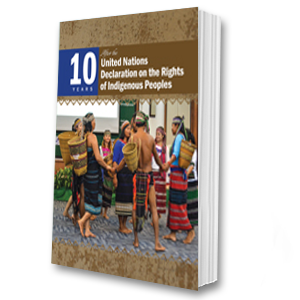pdf Assessing the Indigenous Peoples Assistance Facility in Asia-Pacific: 10 Years After the UN Declaration on the Rights of Indigenous Peoples
1075 downloads
10 years after the undrip.pdf

The stories narrated in this publication tell us that when indigenous peoples communities and families are given direct financial support, they succeed in achieving their lives strategies.
The important element that emerges from this publication is the importance of gathering the knowledge and experience that emerge from the small projects financed by the Indigenous Peoples Assistance Facility (IPAF) of the International Fund for Agricultural Development (IFAD).
The IPAF finances small projects up to US$50,000. This may seem small, but feedback from indigenous peoples who took advantage from the IPAF funded projects tell us that from their perspective this support is considerable at the community level. What matters most to the communities and their organizations is not simply the money they receive through the awarded IPAF grants, rather the power transferred to them in the process to make their own decisions at community and family level with the available resources. Moreover, we have learned that the IPAF small projects are an important tool for women's role in decision-making.
The communities are adopting innovations, such as the use drone mapping and land use of the Jawatn territory in Indonesia, which is contributing to Village Regulation on the Protection and Management of Customary Forest. This is a preparatory step to their application for the formal recognition of Mondi customary forest in accordance with the Minister of Environment and Forestry Regulation.
This publication is in itself innovative in showing how the projects financed through the IPAF are contributing to the implementation of the UN Declaration on the Rights of Indigenous Peoples, particularly Article 23, whereby Indigenous peoples have the right to determine and develop priorities and strategies for exercising their right to development. In particular, indigenous peoples have the right to be actively involved in developing and determining health, housing and other economic and social programmes affecting them and, as far as possible, to administer such programmes through their own institutions.

